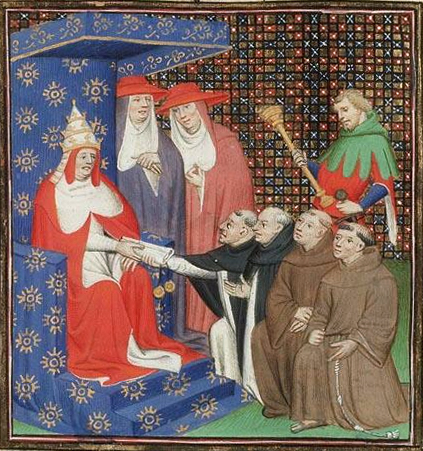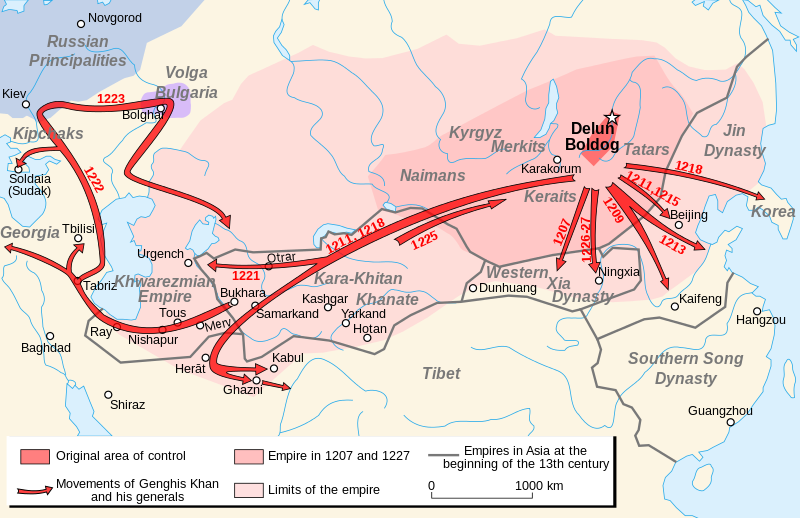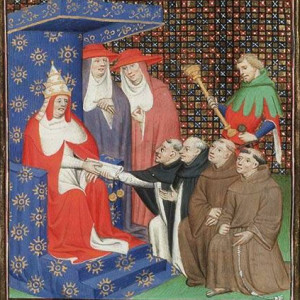
Today, the State Department took a big, albeit long-overdue, step in publicly acknowledging that Daesh (ISIS) is committing genocide against Middle Eastern Christians, as well as other groups. Secretary Kerry had this to say:
My purpose in appearing before you today is to assert that, in my judgment, Daesh is responsible for genocide against groups in areas under its control, including Yezidis, Christians, and Shia Muslims. Daesh is genocidal by self-proclamation, by ideology, and by actions – in what it says, what it believes, and what it does. Daesh is also responsible for crimes against humanity and ethnic cleansing directed at these same groups and in some cases also against Sunni Muslims, Kurds, and other minorities. [….]
We know that in Mosul, Qaraqosh, and elsewhere, Daesh has executed Christians solely because of their faith; that it executed 49 Coptic and Ethiopian Christians in Libya; and that it has also forced Christian women and girls into sexual slavery. [….]
We know that Daesh’s actions are animated by an extreme and intolerant ideology that castigates Yezidis as, quote, “pagans” and “devil-worshippers,” and we know that Daesh has threatened Christians by saying that it will, quote, “conquer your Rome, break your crosses, and enslave your women.” [….]
One element of genocide is the intent to destroy an ethnic or religious group, in whole or in part. We know that Daesh has given some of its victims a choice between abandoning their faith or being killed, and that for many is a choice between one kind of death and another.
The fact is that Daesh kills Christians because they are Christians; Yezidis because they are Yezidis; Shia because they are Shia. This is the message it conveys to children under its control. Its entire worldview is based on eliminating those who do not subscribe to its perverse ideology. There is no question in my mind that if Daesh succeeded in establishing its so-called caliphate, it would seek to destroy what remains of ethnic and religious mosaic once thriving in the region.
The situation is horrific, a fact recently illustrated in the martyrdom of four religious sisters of the Missionaries of Charity, Mother Teresa’s order. But it’s worth remembering that the Church has seen this sort of thing, and worse, before.
In the thirteenth century, a dark force rose from the East. Rising up from past the known world’s end, murderous hordes of conquering Mongolian invaders quickly laid waste to Russia and central Asia and poured into Europe. As the dates on this map show, the Mongolian Empire just sort of… appeared overnight.

The violence inflicted was as cruel as it was random. Just listen to these accounts from The Chronicle of Novgorod, 1016-1471:
The same year [1224], for our sins, unknown tribes came, whom no one exactly knows, who they are, nor whence they came out, nor what their language is, nor of what race they are, nor what their faith is; but they call them Tartars, and others say Taurmen, and others Pecheneg people, and others say that they are those of whom Bishop Mefodi of Patmos bore witness, that they came out from the Etrian desert which is between East and North.
For thus Mefodi says, that, at the end of time, those are to appear whom Gideon scattered, and they shall subdue the whole land from the East to the Efrant, and from the Tigris to the Pontus sea except Ethiopia. God alone knows who they are and whence they came out. Very wise men know them exactly, who understand books; but we do not know who they are, but have written of them here for the sake of the memory of the Russian Knyazes and of the misfortune which came to them from them.
In this particular incident, the chronicler recounted how these mysterious Tartars easily slaughtered their infighting Russian foes, and then used the bodies as benches upon which to eat dinner. He concludes by saying:
And thus, for our sins God put misunderstanding into us, and a countless number of people perished, and there was lamentation and weeping and grief throughout towns and villages. This evil happened on May 31, on Saint Eremei’s Day. And the Tartars turned back from the river Dnieper, and we know not whence they came, nor where they hid themselves again; God knows whence he fetched them against us for our sins.
News of this terrifying presence quickly spread throughout Europe… followed quickly by the invading Tartars themselves. In this context, what is the pope to do?
Pope Innocent IV came up with a solution: he dispatched emissaries and missionaries, both to call the Mongols to peace, and to tell them about Jesus Christ. This second mission is worth reflecting upon: even at what must have seemed like the darkest hour, the pope didn’t let us just think of the Mongols as diabolical invaders and enemies, but as souls as much in need of salvation as our own.
Mohamad Ballan has translations of the popes’ letters, and the Mongols’ baffled response. One of them reads:
Seeing that not only men but even irrational animals, nay, the very elements which go to make up the world machine, are united by a certain innate law after the manner of the celestial spirits, all of which God the Creator has divided into choirs in the enduring stability of peaceful order, it is not without cause that we are driven to express in strong terms our amazement that you, as we have heard, have invaded many countries belonging both to Christians and to others and are laying them waste in a horrible desolation, and with a fury still unabated you do not cease from stretching out your destroying hand to more distant lands, but, breaking the bond of natural ties, sparing neither sex nor age, you rage against all indiscriminately with the sword of chastisement.
We, therefore, following the example of the King of Peace, and desiring that all men should live united in concord in the fear of God, do admonish, beg and earnestly beseech all of you that for the future you desist entirely from assaults of this kind and especially from the persecution of Christians, and that after so many and such grievous offenses you conciliate by a fitting penance the wrath of Divine Majesty, which without doubt you have seriously aroused by such provocation; nor should you be emboldened to commit further savagery by the fact that when the sword of your might has raged against other men Almighty God has up to the present allowed various nations to fall before your face; for sometimes He refrains from chastising the proud in this world for the moment, for this reason, that if they neglect to humble themselves of their own accord He may not only no longer put off the punishment of their wickedness in this life but may also take greater vengeance in the world to come.
On this account we have thought fit to send to you our beloved son [Giovanni DiPlano Carpini] and his companions the bearers of this letter, men remarkable for their religious spirit, comely in their virtue and gifted with a knowledge of Holy Scripture; receive them kindly and treat them with honor out of reverence for God, indeed as if receiving us in their persons, and deal honestly with them in those matters of which they will speak to you on our behalf, and when you have had profitable discussions with them concerning the aforesaid affairs, especially those pertaining to peace, make fully known to us through these same Friars what moved you to destroy other nations and what your intentions are for the future, furnishing them with a safe-conduct and other necessities on both their outward and return journey, so that they can safely make their way back to our presence when they wish.
In the letter accompanying it, Innocent summarizes the Gospel, and in doing so explains his own role and the purpose for his writing:
[Jesus] therefore offered Himself as a victim for the redemption of mankind and, overthrowing the enemy of its salvation, He snatched it from the shame of servitude to the glory of liberty, and unbarred for it the gate of the heavenly fatherland. Then, rising from the dead and ascending into heaven, He left His vicar on earth, and to him, after he had borne witness to the constancy of his love by the proof of a threefold profession, He committed the care of souls, that he should with watchfulness pay heed to and with heed watch over their salvation, for which He had humbled His high dignity; and He handed to him the keys of the kingdom of heaven by which he and, through him, his successors, were to possess the power of opening and of closing the gate of that kingdom to all. Wherefore we, though unworthy, having become, by the Lord’s disposition, the successor of this vicar, do turn our keen attention, before all else incumbent on us in virtue of our office, to your salvation and that of other men, and on this matter especially do we fix our mind, sedulously keeping watch over it with diligent zeal and zealous diligence, so that we may be able, with the help of God’s grace, to lead those in error into the way of truth and gain all men for Him.
Güyük, the Mongol Khan, wrote back an angry and confused letter demanding the pope submit. He begins by expressing his confusion, seemingly incapable of understanding either why he would want to get baptized, or why he shouldn’t kill conquer his weaker neighbors:
If bearer of this petition reaches you with his own report, you, who are the great Pope, together with all the Princes, must come in person to serve us. At that time, I shall make known all the commands of the Yasa.
Further, you have also said that there would be an advantage for me in accepting baptism. You have imparted this to me, and sent a request to this effect. This your appeal, I have not understood.
Furthermore, you have sent the following message: “You have conquered all the lands of the Hungarians and other Christians. This seems strange to me. Tell me what was their crime” I have also not understood this message of yours.
To defend his murderous conquest, Güyük insisted that God must be on the Mongolian side, since the Mongols were so good at killing and conquest:
Chinggis Khan and the Great Khan Ögedey have both transmitted the order of the Eternal God that the all the world should be subordinated to the Mongols to be taken note of. But they disregarded God’s order to such an extent that those mentioned by you even held a great council, and they behaved arrogantly in refusing, and they killed our messengers and envoys. Thus the Eternal God Himself has killed and exterminated the people in those countries. How could anybody, without God’s order, merely from his own strength, kill and plunder? And when you go on to say, “I am a Christian, I honor God.” How do you think you know whom God will absolve and in whose favor He will exercise His mercy? How do you think you know that you dare to express such an opinion?
Through the power of God, all empires from the rising of the sun to its setting have been given to us and we own them. How could anyone achieve anything except by God’s order? Now, however, you must say with a sincere heart: “We shall be obedient, we, too, make our strength available. You personally, at the head of the Kings, you shall come, one and all, to pay homage to me and to serve me. Then we shall take note of your submission. If, however, you do not accept God’s order and act against our command, we shall know that you are our enemies.
The pope then responded with one more letter, further explaining that the Mongols’ souls were endangered by their bloodthirsty lifestyle and their rejection of Jesus Christ, and again encouraging them towards humility, peace, and the Gospel.
While Pope Innocent’s evangelical outreach wasn’t an immediate success, he did help to open the doors for Catholic missionaries to work amongst the Mongolian people, and they had somewhat greater success under Güyük’s successor, Möngke Khan. By the fourteenth century, the Mongolian Empire had become a historical footnote, while the always-seemingly-on-the-verge-of-being-defeated Roman Catholic Church survived, thrived, and continued to spread the Gospel, as she does today.

In retrospect, the world got lucky when dealing with the Mongols. They could have easily continued their march into Germany and Austria, as they defeated Hungary and Poland, and then swung down and subjugated Italy simply for the plunder. They proved themselves able to bring down fortified cities and castles, as they did in Russia. Perhaps they were too stretched logistically at this point. We will never know exactly why the Mongols did not press on. Perhaps they were disappointed by how little there was of value the deeper they pressed into Europe, and not knowing much about western Europe, simply did not view it as worth it.
About two decades later the Mongols struck again, destroying the Abbasid Caliphate and pressing the advantage towards Egypt until the Great Khan died and in-fighting prevented a farther advance. The Mamhluks really did not have many men to resist the Mongols at this point, so their collapse would have been guarenteed. After this point it would be impossible to speculate what the Mongols would do next. Of course, it would have been great if they pressed on into North Africa and essentially destroyed the remainder of the Muslim world outside of Arabia, but likely this was not going to happen. The Mongols tended to convert to Islam rather quickly, and they were out for plunder. North Africa would not contain the plunder they were looking for, so likely they would turn back and go husband their forces for an attack of Byzantium that would never come. By the 1270s, decadence had firmly entrenched itself in the once rough and tough nomadic steppe peoples. They lost the “eye of the Tiger,” started infighting between one another, and the world exhaled.
“it would have been great if they pressed on into North Africa and essentially destroyed the remainder of the Muslim world outside of Arabia”
I think it would be best if they had destroyed all of Christendom too. The world would be a much better place without the hatred, sexism and violence that religion spreads.
Stop being stupid
Shut up. You have no evidence.
hi rileu-=y==yvn
boi
i hate dio
I love DIO
Oh Yeah Yeah
All hail the Great Khan